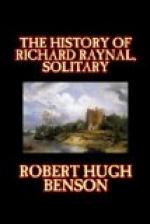* * * * *
He desired, after his simplicity, on the following morning, to speak with my lord abbot, but that could not be, and he only saw my lord at terce before mass, afar off sitting in his stall, a great prelate with his chain, and with one who bore a silver wand to go before him and do him service.
He prayed long in the church and at the shrine, and heard four or five masses, and saw the new grave of the Queen in the midst of the lady-chapel [This may have been Queen Katharine, whose body was afterwards moved.], and did his devotions, hoping that our Lord would show him what to speak to the King, and then went to dinner, and after dinner set out to Westminster Hall, where he was told that the King could be seen that day.
He passed through the little streets that lay very nastily, no better than great gutters with all the filth of the houses poured out there, but he said that the folks there were yet more surprising, for these were they who had taken sanctuary here, and were dwelling round the monastery with their wives and children. There were all sorts there, slayers of men and deer, thieves, strikers of the clergy suadente diabolo ["at the devil’s persuasion”—a technical phrase], false-coiners, harlots, and rioters; all under the defence of Religion, and not suffered to go out but on peril of being taken. He had a little company following him by the time that he came to the gate, some mocking and some silent, and all looking on him as he went.
When he came to the door of the hall the men that stood there would not let him in until he entreated them. They told him that the King was now going to dinner, and that the time was past, so he knew that it was not yet his hour to give the message that he knew not. But they let him in at last, and he stood in the crowd to see the King go by.
There was a great company there, and a vast deal of noise, for the audiences were done, and the bill-men were pushing the folks with their weapons to make room for the great men to go by, and the heralds were crying out. Master Richard stood as well as he could, but he was pushed and trampled about, and he could not see very well. They went by in great numbers; he saw their hats and caps and their furred shoulders between the crooked glaives that were gilded to do honour to the King, but there was such a crying out on all sides that he could not ask which was the King.
At last the shouting grew loud and then quiet, and men bowed down on all sides; and he saw the man whom he knew must be the King.
He had a long face (as I saw for myself afterwards), rather sallow, with a long straight nose and small, full mouth; his eyebrows were black and arched high, and beneath them his sorrowful eyes looked out on the people; he was bowing his head courteously as he came. On his head he wore a black peaked cap of velvet; there was ermine at his collar and a gold chain lay across his shoulders.




